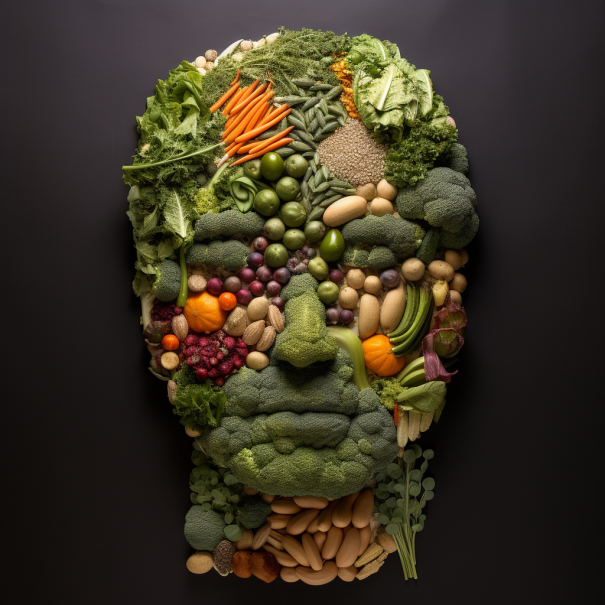The Impact of a Plant-Based Diet on Crohn’s Disease: An Overview
***The information contained in this article is for informational purposes only and is not intended to be a substitute for professional medical advice, diagnosis, or treatment. Always seek the advice of your physician or other qualified health provider with any questions you may have regarding a medical condition. Published 2023
Crohn’s disease, a chronic inflammatory bowel disease, has long been a source of discomfort and uncertainty for millions of people worldwide. While no known cure exists, various treatment options can manage symptoms and promote remission. Among these, dietary modifications, particularly a plant-based diet, have shown promise in improving symptoms and overall well-being for individuals with Crohn’s disease. This article aims to provide an overview of Crohn’s disease, the benefits of a plant-based diet, and how the latter can potentially influence the former.
Understanding Crohn’s Disease
Crohn’s disease is a chronic condition that affects the digestive tract, causing inflammation that can lead to severe symptoms. The exact cause remains unknown, but it’s believed to be a combination of genetic, environmental, and immune system factors. Symptoms can vary greatly from person to person, but common ones include abdominal pain, diarrhea, fatigue, weight loss, and reduced appetite.
The disease is characterized by periods of remission, where symptoms are absent or mild, and flare-ups, where symptoms become severe. Complications can include malnutrition, bowel obstructions, and an increased risk of developing other conditions.
A more detailed exploration of Crohn’s disease, its causes, symptoms, and complications can be found in our dedicated article on the subject.
Read More Insights on Chron’s Disease Here: https://plantpoweredmeats.com/uncategorized/crohns-disease-insights/391/
Symptoms of Crohn’s Disease
The symptoms of Crohn’s disease can significantly impact the quality of life for individuals living with the condition. These symptoms can vary greatly from person to person and may also affect other parts of the body, such as the skin, joints, and eyes. The most common symptoms include abdominal pain, diarrhea, fatigue, weight loss, and reduced appetite.
Understanding these symptoms and how they manifest is crucial for managing the disease effectively. For a more comprehensive understanding of the symptoms of Crohn’s disease and how they can be managed, refer to our in-depth article on the topic.
Read More Insights On Crohn’s Disease Here: https://plantpoweredmeats.com/uncategorized/crohns-disease-symptoms-and-treatments/401/
Current Treatments for Crohn’s Disease
The treatment of Crohn’s disease typically involves a combination of medication, lifestyle changes, and, in some cases, surgery. The types of medications commonly prescribed include anti-inflammatory drugs, immunosuppressants, and biologic therapies.
It’s important to note that treatment plans are individualized, as different approaches may be more suitable depending on the severity and location of the disease. For a more detailed look at the current treatments for Crohn’s disease, check out our comprehensive article on this subject.
Read More Insights On Chron’s Disease Here: https://plantpoweredmeats.com/uncategorized/crohns-disease-symptoms-and-treatments/401/
Understanding Plant-Based Diets
A plant-based diet is an eating pattern that focuses on whole plant foods, such as fruits, vegetables, whole grains, legumes, nuts, and seeds, while minimizing or avoiding animal products. There are different variations of a plant-based diet, ranging from vegetarian to vegan, and it can be adapted to individual preferences and dietary needs.
A well-planned plant-based diet can provide all the necessary nutrients, including protein, healthy fats, vitamins, and minerals. For a more in-depth understanding of plant-based diets, their benefits, and how to adopt them, refer to our detailed article on this topic.
Read The Ultimate Guide Here – https://plantpoweredmeats.com/benefits/beneficial-power-of-a-plant-based-diet-for-crohns-disease/419/
Benefits of a Plant-Based Diet for Crohn’s Disease
Adopting a plant-based diet can provide several benefits for individuals with Crohn’s disease. Firstly, plant-based foods are naturally high in fiber, which can help regulate bowel movements and improve stool consistency. Secondly, a plant-based diet can promote a healthy balance of gut bacteria, essential for optimal digestive function and overall gut health.
Furthermore, a plant-based diet has been associated with a reduced risk of developing other chronic diseases, such as heart disease, type 2 diabetes, and certain types of cancer. Lastly, a plant-based diet offers a wide variety of flavorful and nutritious options, making it easier for individuals with Crohn’s disease to adhere to dietary recommendations. For a more comprehensive look at the benefits of a plant-based diet for people with Crohn’s disease, check out our dedicated article on this subject.
Read More More About The Benefits Of A Plant-Based Diet and Crohn’s Disease Here: https://plantpoweredmeats.com/uncategorized/crohns-disease-insights/391/
Case Studies
There are several real-life case studies of individuals with Crohn’s disease who experienced positive outcomes after adopting a plant-based diet. These case studies provide valuable insights into the potential benefits of a plant-based diet for managing Crohn’s disease. However, it’s important to note that while these case studies provide valuable insights, more research is needed to establish the effectiveness of plant-based diets for Crohn’s disease on a larger scale.
“Crohn’s Disease Remission with a Plant-Based Diet: A Case Report“
“Plant-based diet leads to Crohn’s disease remission“
“Plant-Based Diet May Help Crohn’s Disease Remission“
“Whole-Food, Plant-Based Diet for Active Crohn’s Disease“
“Could a plant-based diet be the answer to Crohn’s disease?“
Conclusion
In conclusion, while Crohn’s disease is a challenging condition to live with, adopting a plant-based diet could potentially offer some benefits in managing the disease. However, it’s crucial to consult with healthcare professionals before making any significant dietary changes to ensure they are suitable for your specific needs and medical condition. As research continues to evolve, we hope to gain a better understanding of the relationship between plant-based diets and Crohn’s disease.
***This article is not intended to provide medical advice, diagnosis, or treatment. The content provided is for informational purposes only and should not be used as a replacement for direct medical advice from your healthcare provider. Always consult a professional healthcare provider if you have any questions about your health or a medical condition.
Related FAQ
What is Crohn’s disease?
Crohn’s disease is a type of inflammatory bowel disease that can affect any part of the gastrointestinal tract. It’s characterized by symptoms like abdominal pain, diarrhea, weight loss, and fatigue.
How can a plant-based diet benefit someone with Crohn’s disease?
A plant-based diet, rich in fruits, vegetables, whole grains, and legumes, can provide fiber and nutrients that may help regulate bowel movements and reduce inflammation. However, individual responses can vary, and it’s important to consult with a healthcare provider before making significant dietary changes.
What are the symptoms of Crohn’s disease?
Symptoms of Crohn’s disease can vary greatly from person to person, but common ones include abdominal pain, diarrhea, fatigue, weight loss, and reduced appetite. Some people may also experience symptoms outside the digestive tract, such as joint pain, skin problems, and eye inflammation.
What are the current treatments for Crohn’s disease?
Treatment for Crohn’s disease typically involves a combination of medication, lifestyle changes, and in some cases, surgery. The types of medications commonly prescribed include anti-inflammatory drugs, immunosuppressants, and biologic therapies.
What does a plant-based diet include?
A plant-based diet focuses on foods derived from plants, including fruits, vegetables, whole grains, legumes, nuts, and seeds. It doesn’t necessarily mean that you are vegetarian or vegan and never eat meat or dairy, but rather that you prioritize plant-based foods in your diet.
Key Take Away
- Consultation with Healthcare Professionals: Emphasize the importance of consulting with healthcare professionals before making any significant dietary changes for individuals with Crohn’s disease to ensure suitability for their specific needs and medical condition.
- Crohn’s Disease Management: Explore how a combination of genetic, environmental, and immune system factors contribute to Crohn’s disease, a chronic inflammatory bowel condition, and the potential role of diet in managing its symptoms.
- Plant-Based Diet Benefits: Discover the potential benefits of a plant-based diet, rich in fruits, vegetables, whole grains, and legumes, in regulating bowel movements and reducing inflammation in individuals with Crohn’s disease.
- Symptom Management in Crohn’s Disease: Understand how the symptoms of Crohn’s disease can vary greatly from person to person, and how a combination of medication, lifestyle changes, and potentially surgery can help manage these symptoms.
- Case Studies on Plant-Based Diet and Crohn’s Disease: Learn from real-life case studies of individuals with Crohn’s disease who have experienced positive outcomes after adopting a plant-based diet, while acknowledging the need for more research.
Glossary
- Crohn’s Disease: A chronic inflammatory bowel disease that affects the lining of the digestive tract. It’s characterized by symptoms such as abdominal pain, diarrhea, fatigue, weight loss, and reduced appetite.
- Plant-Based Diet: An eating pattern that emphasizes foods derived from plants, including fruits, vegetables, whole grains, legumes, nuts, and seeds, while minimizing or avoiding animal products.
- Inflammatory Bowel Disease (IBD): A term used to describe disorders that involve chronic inflammation of the digestive tract, including Crohn’s disease and ulcerative colitis.
- Remission: In the context of Crohn’s disease, remission refers to a period where symptoms are absent or mild. Achieving and maintaining remission is a primary goal in the management of Crohn’s disease.
- Flare-Up: A term used to describe a period of severe symptoms in chronic conditions like Crohn’s disease. Flare-ups can vary in frequency and duration.
- Anti-Inflammatory Drugs: Medications used to reduce inflammation in the body. In the context of Crohn’s disease, these drugs can help manage symptoms and promote remission.
- Immunosuppressants: A class of drugs that reduce the body’s immune response. They are often used in the treatment of autoimmune conditions like Crohn’s disease.
- Biologic Therapies: A type of treatment that uses substances made from living organisms to treat diseases. In Crohn’s disease, biologic therapies can help reduce inflammation and other symptoms.
- Gut Bacteria: Also known as gut microbiota, these are the microorganisms that live in the digestive tracts of humans. They play a crucial role in health and disease, including conditions like Crohn’s disease.
- Fiber: A type of carbohydrate found in plant foods that the body can’t digest. It can help regulate bowel movements, reduce inflammation, and provide other health benefits.
Additional Resources
- Books:
- The Plant-Based Gut: How to Restore Your Digestive Health and Reverse Chronic Inflammation by Brenda Davis and Michael Greger
- Crohn’s Disease: A Plant-Based Approach by Neal Barnard
- The Complete Idiot’s Guide to a Plant-Based Diet by Sharon Palmer
- Studies:


